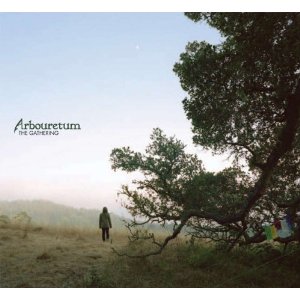Esoteric reference points are far from rare in music right now, from the resonant, occult electronica of Demdike Stare to the high-gloss new-New Age aesthetic of the Altered Zones site. But Dave Heumann’s assertion that the latest album by his psychedelic rock group, Arbouretum, was inspired by Carl Jung’s Red Book seems to belong to an earlier, quirkier yet somehow more earnest era of pop-countercultural reference: the time of Popol Vuh, Germans named after the Mayan Book of the Dead; of Judee Sill’s ‘Good Ship Omega’ (“alpha-bound…”); Carl Wilson writing Hindu Vedas into the swooning harmonies of The Beach Boys’ ‘All This Is That’. (Now’s not the time to delve into Mike Love’s grim hymn to transcendental meditation, or indeed the many other tracks from the Beach Boys’ ‘self help’ period, which look to astrology, chiropody, macrobiotics, psychic healing and pop psychology for inspiration.) You could even include in this lineup Jimmy Webb’s ponderous reincarnation ballad, ‘Highwayman’, a faithful and dreamy cover of which appears on The Gathering.
I haven’t read The Red Book and won’t patronize you with a hastily-wiki’d précis of Jung’s theories of the unconscious, but it seems that Heumann has attached himself to and explored his source material with a certain old-fashioned vigour and wide-eyedness that goes beyond merely plundering for cool song titles. Opening track, ‘The White Bird’, has the feel of direct citation, the vocal line wordy and ornate, almost-but-not-quite awkward when set against a core melody that’s mobile and simple like a folk tune. As the first of The Gathering’s many guitar solos unfolds, tumbling up and down the scale, it’s like a pleasurable struggle between the free-flying unconscious mind – represented in the sound and the music – and our need to nail experience in words. It’s all anchored down with a pounding Ur-rock beat and fuzz bass, in case the above sounds a bit too heavy.
Of course, the countercultural echoes are sonic and musical too. Like their compadres in gnarled latter-day psych such as Earth, Espers and Six Organs of Admittance, Arbouretum have always drawn heavily from 1960s and 70s rock. From their deeply absorbed influences they create elegant and often surprising songs that do far more than simply mine a retro shtick, a rare craft that I’ve written about before. On this new release, while the songs are still strong, the focus is also on their arrangement. Heumann is an inventive, thoughtful guitarist who uses the tone of his instrument to characterize each Arbouretum album in a way that only takes hold after a few listens, and it’s this you notice the most about The Gathering. After 2009 album Song of the Pearl’s hazy, verdant atmosphere, The Gathering harks back to the harder textures of 2007’s Rites Of Uncovering, adding a further edginess, a kind of tightly wound, classic metal feel that comes to the fore in ‘Destroying To Save’. Heumann’s guitar sound on this album has a nice insular, slightly obsessive quality, in keeping perhaps with The Gathering’s psychoanalytic genesis, which reaches epic proportions on 10-minute closer, ‘Song of the Nile’ with its chromatic solo-upon-solo-upon-solo middle section, more King Crimson and European prog than American psych-folk.
Literally, Heumann is more solitary than on previous albums: fellow guitarist Steve Strohmeier, who added to the lovely cacophony on Pearl, is absent from The Gathering. Stepping into the breach, Corey Allender’s bass assumes a more melodic role, often pitched high and distorted, which adds a wiry, choppy quality, and vintage synths allow for alienated voices (the squelching, spiralling ‘Waxing Crescents’) and odd vistas within the songs’ architecture. Keyboardist Matthew Pierce is also credited with percussion, which suggests bongo and cowbell jams, but for most part he seems to double up with JV Brian Carey’s restrained and powerful drums: when all else is heading for the stratospheres, the rhythm of The Gathering remains centred and forceful, with a Krautrocky pulse.
When The Gathering deviates from its predominant fried and effects-heavy template, with the energetic, almost Hüsker Dü-ish ‘The Empty Shell’ and solemn ballad ‘When Delivery Comes’, a typically stealthy, stately Arbouretum classic, it doesn’t disappoint; although as a whole the album hangs together slightly less than its predecessors. The slight air of sonic and stylistic tension is perhaps a by-product of a changed line-up, or something more abstract and connected to Heumann’s delving into Jung’s visions: the paranoia inherent in any revelation and the fear that accompanies the seeking of knowledge. It might be this that most of all places The Gathering in the canon of gnostically inclined rock music. It is never complacent and, for all its accomplished licks and satisfying cadences, sounds an authentic note of unease: “Let’s go inside before it starts to rain,” prophesies Heumann at the end of ‘Destroying To Save’, with eyes audibly to the skies.


